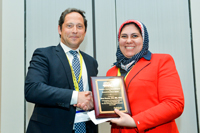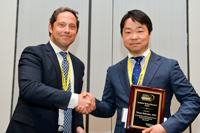2017-08-03

Dr. Mona Hamoda (R) with Dr. Olivier Vanderveken, AADSM research committee chair.
Dr. Mona Hamoda, a year-three doctoral candidate in Craniofacial Science, is the recipient of two awards from the American Academy of Dental Sleep Medicine (AADSM). She was selected for the Graduate Student Research Excellence Award for most outstanding research project and placed first for a Graduate Student Research Award. The objectives of her work, titled “Long-Term Side Effects of Sleep Apnea Treatment with Oral Appliances,” were to determine the nature of the changes (if they are dental and/or skeletal in nature) associated with long-term oral appliance treatment and to evaluate the magnitude and progression of these changes.
Her study represents the longest observational period to date examining oral appliance side effects, with up to 21 years of follow up for some patients. Employing cephalometric analysis (using radiographs of the facial, dental and skeletal structures to assess relationships), Hamoda was able to characterize the nature, magnitude and progression of the oral appliance side effects—which is an important step toward mitigation.

Dr. Yuuya Kohzuka (R) with Dr. Olivier Vanderveken, AADSM research committee chair.
The AADSM also bestowed a Graduate Student Research Award on Dr. Yuuya Kohzuka, an international student at UBC from Showa University in Japan, for his research titled, “Difference in Dental Arch Size Between Japanese and Caucasian Patients with Obstructive Sleep Apnea: An International Comparison Study.”
Kohzuka found that Japanese people with obstructive sleep apnea (OSA) have a larger tongue and maxillary and mandibular dental arches in comparison with Caucasian people with OSA, but the degree of oropharyngeal crowding is the same between the two groups. His study is the first of its kind to focus on dental arch difference among races.